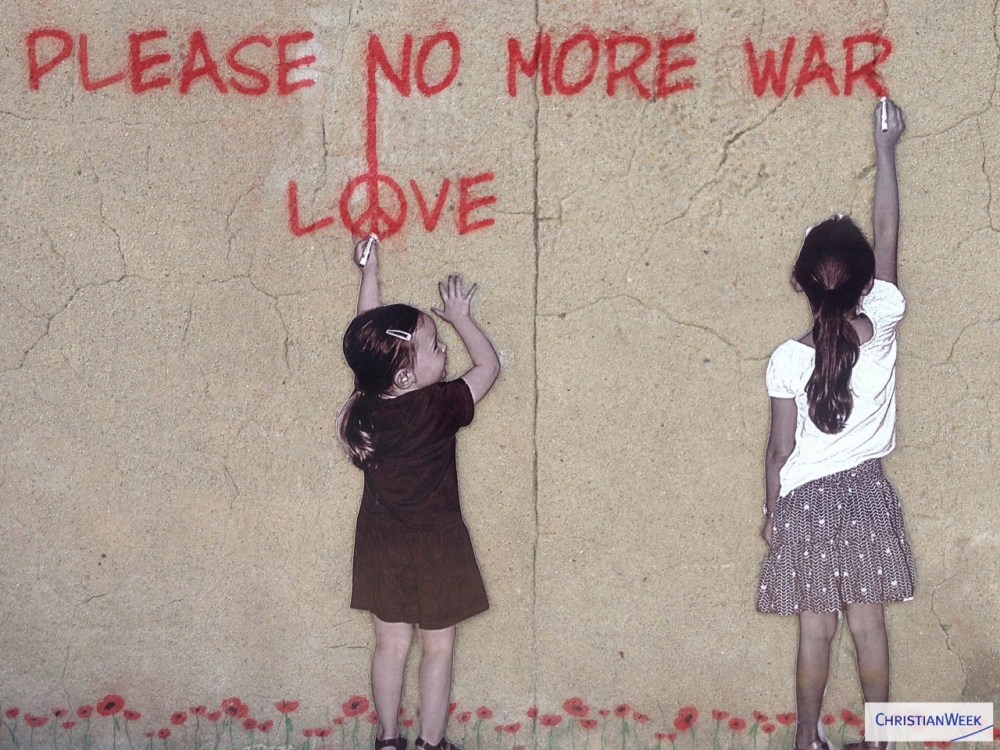
By Bruxy Cavey
August 31, 2016
The Bible teaches Christians that we are engaged in a spiritual war against a spiritual enemy. The implication seems to be that we ought not get involved in physical, earthly wars, but focus on the real war behind all wars. In fact, this is what the clear teaching of Jesus, the example of Jesus, and the teachings of the early Church confirm.
Still, I’m sometimes asked, “Can’t we be involved in a spiritual battle AND take on any earthly enemy with actual weapons and be involved in physical violence?” We can see that throughout history the Church has certainly tried to say this. But at The Meeting House, we say a clear no— you can’t do both.
Here’s why we belong to what’s called a Peace Church tradition, and here are five reasons why we would say no when someone asks, “Can we do both?”
1. Because we are at war with the very ideas behind war. Wrap your mind around that for a second. Paul said we’re at war against ideas, thoughts, arguments (2 Corinthians 10:3-5), and some of those bad ideas are the bad ideas about war itself. We’re at war with the bad ideas behind war itself— ideas that devalue human life rather than treat every person as an infinitely precious image bearer of God.
2. Because we are also at war against a spiritual enemy. An enemy that desires to deceive, devalue, and destroy humans. People are never the real enemy (Ephesians 6:12), they are POW’s in need of rescue.
3. Because Jesus teaches and models the way of self-sacrifice and enemy love for all his disciples (Matthew 5:44). No exceptions, stamped it, no erasies. This is for all of us.
4. Because enemy love is at the heart of the Gospel. We love our enemies to death because God loved his to death. Romans 5:6-11 says that God loved us while we were still sinners; he loved us even while we were still enemies. That’s the heartbeat of the Gospel. We live out the Gospel when we’re willing to die for our enemies— loving them to death.
5. Because Jesus brings a New Covenant. This means a new way of being in relationship with God and others. This changes our concept of how we view and define things like kingdom, nation, country, citizen, loyalty, ethnicity, race, and all other ways humans divide. Our citizenship is in the Kingdom of God.
We don’t think in terms of our country vs. the other country, because we’re not part of these countries. Our Kingdom is off the map. We fight differently, we take a stand for a different kind of Kingdom, and so we live differently.
This does present a challenge when we talk about war and times of war. For example, members of our denomination, the Brethren in Christ (BIC Canada), were conscientious objectors during World War II. People had different ways of trying to figure out what we believed.
We believed that the atrocities being committed were wrong, we wanted to stand against them, but we don’t fight so what could we do? Being a pacifist doesn’t mean being passive. It means seeing peace not only as the ends to be achieved, but the means. So we can ask the tough question of “how can we as pacifists contribute?”
There were other denominations during this time that also followed the peace tradition and would have to ask the same tough questions to figure out how they can contribute.
We acknowledge that it does give us a particular challenger during times of war, but this doesn’t mean that we run away. On the contrary we run toward the conflict and actively contribute in whatever way we can as pacifists. I would say it’s always okay to die for a cause, but never okay to kill for a cause. This is how we want to live.
For the full message check out: https://youtu.be/CabNYfiy_h0




